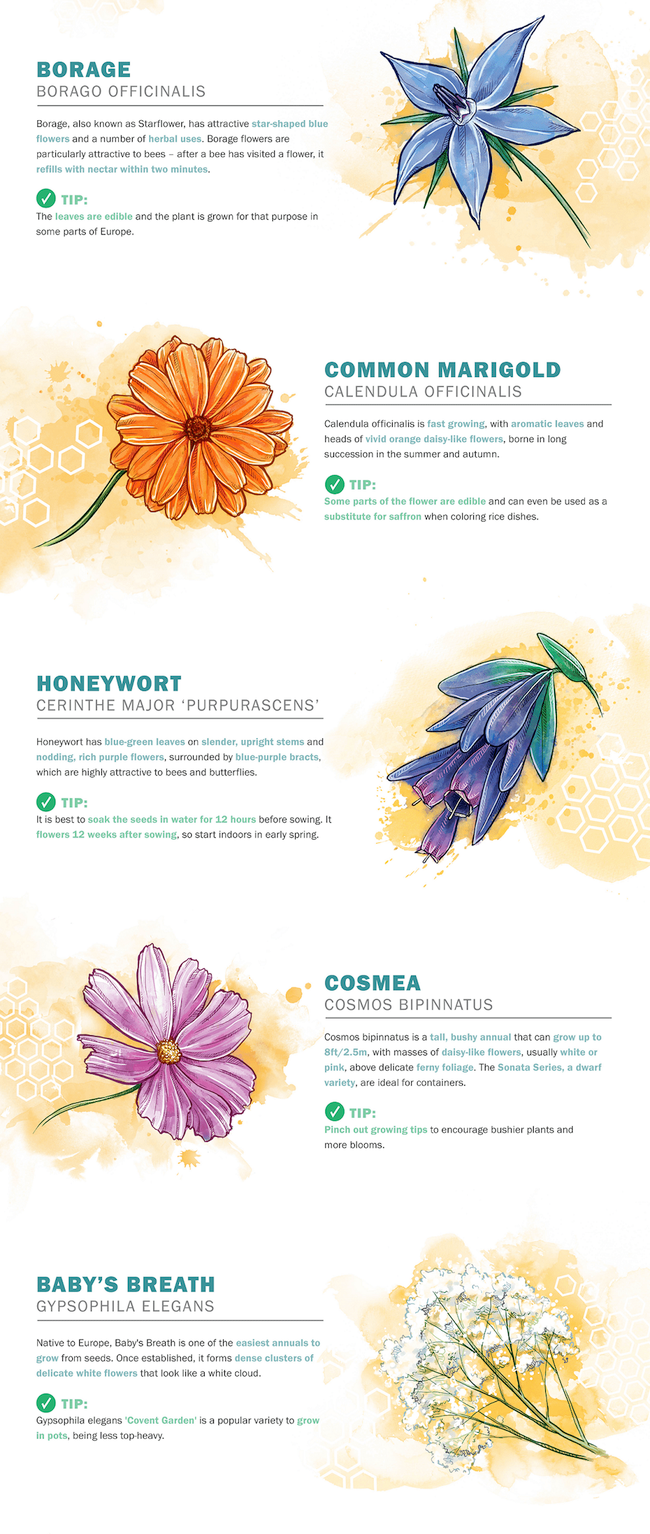Bees are not the only pollinators that are at risk for extinction, so are bats, birds, butterflies, and some flies, all that can pollinate to help your garden. Supplies of chocolate and coffee are at risk as pollinating bees and butterflies are being driven to extinction, and heck no we can't have that. LOVE MY TIMMIES. So what can YOU do to help these pollinators stop dying. 
We can grow the right Flowers that attract them. This post will outline 5 flowers to plant that are bee and butterfly friendly. The flowers I will share about today are annuals. I read this excellent article and really thought it was worth sharing. So we all can do our part and help save these critters and of course our coffee and chocolate.
Make your garden attractive to bees by planting specific plants, but be sure they're organic and indigenous to your region.
Plant a bee-friendly garden and the little fuzzy pollinators will come. With populations dwindling dangerously, bees need help more than ever. Scientists attribute bees’ decline – both domesticated honeybees and wild pollinators – to various factors that include pesticides, parasites, stress, and the disappearance of wildflowers. By planting the annual flowers that bees love, you can give them a place to be (pun absolutely intended).
The 5 bee-friendly plants that are easy to grow in gardens, window boxes, and containers, and whose colorful flowers will attract nectar-seeking bees.

It is important, however, to ensure that the plants you choose are local to your region, since plants outside of their native range can cause a lot of damage.
Also, check your source for seeds and seedlings very carefully. A 2014 report found that so-called ‘bee-friendly’ plants sold at 71 Home Depots, Lowe’s, and Walmart stores across the United States and Canada, including daisies, asters, marigolds, lavender, and primrose, contained levels of neonicotinoid insecticides high enough to impair a bee seriously, if not kill it. Shockingly, the manufacturer-recommended doses for gardens and landscapes far exceed those typically found in agricultural settings.
Look for organic plants; ask around for a local provider that has reduced its neonicotinoid use; and be OK with an imperfect garden with a few bugs in it.
Happy Trails
Sources:
https://www.treehugger.com/lawn-garden/10-bee-friendly-annual-flowers.html
Yes!! This is so important:) Making bee hotels are another great way to support honey bees and solitary bees.
One thing to point out: baby's breath is considered at noxious weed in Alberta (who knew, right?!). If the province or your municipality discovers baby breath in your property, they will require you to remove it. Not sure about any other Provinces though.
Really. I was not aware of that. Thank you for sharing
Very good! I love borage for so many reasons and when it is filling up my garden with its lovely blue flowers, the bees abound, it is wonderful! I had read before that it also increases their honey production.
This is a subject I care a lot about because my grandpa was a beekeeper, we still have 4 hives in the garden. Upvoted!
thank you
I agree - just as important as crypto :D Seriously - 1000x more important than Global Warming BS !!!
If one is so inclined, it is imperative that more people become honeybee keepers. Not so much for the honey(that is a simply a reward for good stewardship), but because they are such important pollinators. In addition to the flowers you mention, they are vital in pollination of many food crops. If you keep bees, and live in an area of farming or orchards, some farmers allow you to keep your hives on their property during the growing season. Some will even allow you to overwinter your hives there. I find honeybees to be fascinating creatures with an interesting lifecycle...
True words you speak. Love your perspective. Thanks
Great post! Re-steemed
Hi! I am a robot. I just upvoted you! I found similar content that readers might be interested in:
https://www.treehugger.com/lawn-garden/10-bee-friendly-annual-flowers.html
I've got a few from that list growing already, but I would love to see more pollinators out there in the garden..Maybe it's time to add some new plants.
Thanks for the informative post. Upvoted and resteemed!
yes I do too. Need to increase my variety so my garden will do much better. Thanks for the vote and resteem
So important to help these garden buddies out!
Resteemed! Great job outlining very important points. If we do not start to care for our pollinators it will change the entire way of life!!!!
Not everyone has the privilege of land without close neighbors but for those of us who do it is very useful to not mow and allow what is natural to the land to grow. We do mow everything in the spring and maintain some of the land near the house and around the orchard but the rest is just left wild.
It is somewhat unsightly but we do have bees and butterflies and wild turkeys and hope to get some guinea fowl at some point if I can find a supplier close by.
We also have a "condo" for mason bees to pollinate the fruit trees in the spring.
Love to hear this. Thanks for sharing.